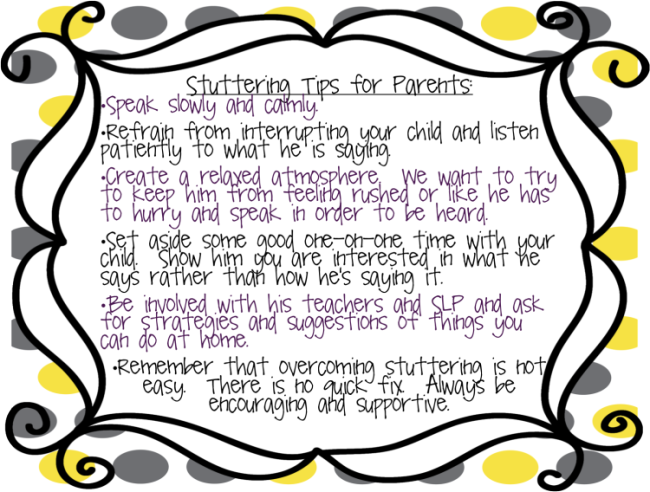As many of you know, my family and I are expecting baby number three in just a few short weeks. As I take some time off from work and blogging to spend time with my family both before and after my new son’s birth, I am thrilled to share with you some amazing posts written by some very talented bloggers. So please sit back, relax and enjoy this guest post and leave a comment letting us know what you think! Today we have Lauren from Busy Bee Speech sharing some great information with you on childhood stuttering. Enjoy!Â
I am so beyond excited to be able to chat with you today! Â Thanks so much to Katie for including me in her fabulous series of guest posts. Â My name is Lauren and I blog over at Busy Bee Speech. Â Today, we are going to peek a little into the world of stuttering.
Fluency (or stuttering) has become something that I’ve kinda had to get a handle on quickly. Â Back in grad school, my professor dubbed me the “fluency queen” because I ended up with so many fluency hours in both diagnostic and treatment. Â Now working in the schools, I somehow end up with all of the stuttering cases. Â I’m beginning to think I’m some sort of magnet for them. Â Haha.
Many kids do go through a typical stuttering stage as preschoolers between ages 2 and 5. Â This happens when they suddenly get that “boost” of language and are quickly learning lots of new vocabulary and language structures. Â For most kids (about 75% according to ASHA) the stuttering will come and go then gradually disappear. Â However, a small percentage never seem to come out of that stage. Â They grow up and continue to stutter, or it may even begin to develop later. Â No matter how their disfluency develops, those who deal severely with stuttering usually have to learn to compensate for it through therapy.
I’m hoping to share with you a few warning signs that your child might be at risk for a fluency disorder and give you a few tips to help along the way.

Check out these signs that could indicate a need for a speech-language evaluation.
- Your child stutters frequently – There could be cause for concern if your child is stuttering more than 10% of the time.  These behaviors include: repeating sounds, syllables, and words, prolonging sounds in words, or tense vocal “blocks” (when they try to produce a word but it seems to get stuck in the throat).
- You have a family member that stutters – Research shows that those who have relatives that stutter are at a greater risk for stuttering than those who do not.  Though the exact cause is still unclear, about 60% of those who stutter chronically were found to have a family member who also stutters.
- Your child has been stuttering longer than 12 months – Phases of typical stuttering usually last no longer than 6-12 months.  A person is more likely to stutter chronically if it has lasted longer than a year.
- Your child has visible tension in their face and neck – Sometimes you can see the struggle and difficulty those who stutter have with getting out words.  You might see their eyes squint, lips quiver, or muscles tighten.  If the stuttering instances are easy and loose with no tension, they are more likely to be exhibiting normal disfluency.
- Your child has difficulty with breath control – Those who stutter at times appear as if they were “out of breath” when talking. Â They might be trying to talk as quickly as possible and say their message all in one breath. Â Or the very act of speaking may be causing such exertion that they feel out of breath.
- Your child began to stutter after the age of 3 1/2Â -Â Â Kids who develop disfluent behaviors later may be more likely to stutter chronically.
- Your child displays fear and avoidance of speaking – Sometimes kids have a difficulty time dealing with their difficulty speaking. Â They may realize that a certain sound or word is hard to say and avoid it altogether.
- Another risk factor – being male – Research has shown that boys are 3-4 times more likely to stutter than girls. Â
If your child does stutter, here are a few recommended tips that you can do at home to support your child.

More excellent resources for fluency include:
Lauren is a school based speech-language pathologist from Louisiana. Â You can follow her blog at busybeespeech.blogspot.com. Â You can also find her on Facebook, Twitter, and TeachersPayTeachers.
Leave a Reply